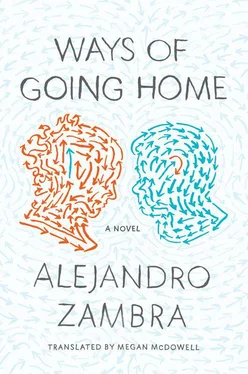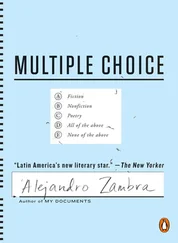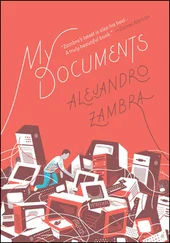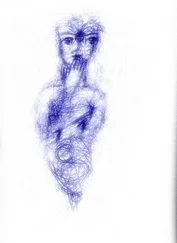“Do you swear?” said Claudia unexpectedly.
“Catholic families swear, in our family we only promise,” said her mother. “But I promise you.”
“I want you to swear it,” the girl said.
“All right, I swear to you,” her mother conceded, and she added that Claudia would always know that the man she called uncle was her father. That was enough. That was the important thing.
At the beginning of 1998, Claudia’s father got his identity back. It was the party’s decision. With the referendum coming up, they needed activists who were publicly committed to practical tasks. Magali went to the airport with her two daughters. The situation was absurd. A week earlier Roberto had left for Buenos Aires with Raúl’s identity and now he was returning as Roberto. He had cut his hair and sideburns a little and he was soberly dressed in blue jeans and a white shirt. He smiled a lot and at one point Claudia thought he seemed like a new man.
They didn’t have to pretend so elaborately, but her mother insisted: the same way she used to look at Claudia reproachfully when she called her father Dad, now she urged her, to an almost ridiculous extent, to say “Dad.” On the plane there were people who actually had been in exile. Claudia remembers having felt a certain bitterness at seeing the families hug, crying in those long, legitimate embraces. For a moment she thought, and was immediately ashamed for thinking it, that the others were also faking. That what they were regaining was not the people but their names. They were undoing, at last, the distance between bodies and names. But no. There were real emotions around her. And when they got home, she felt that her emotion was real as well.
“It’s a terrible story,” I tell her, and she looks at me, surprised.
“No,” she answers, and she says my name several times, as if I had been asleep for a long time and she wanted to wake me up little by little. “My story isn’t terrible. That’s what Ximena doesn’t understand: our story isn’t terrible. There was pain, and we’ll never forget that pain, but we also can’t forget the pain of others. Because we were protected, in the end; because there were others who suffered more, who suffer more.”
We walk along Grecia Avenue past the College of Philosophy, and then I remember a story or hundreds of stories from that time, but I feel a little stupid, it seems like anything I could talk about would be trivial. We reach the National Stadium. The largest detention center in 1973 was always, for me, no more than a soccer field. My first memories of it are happy, sportive ones. I’m sure that I ate my first ice cream in the stadium’s stands.
Claudia’s first memory of the stadium is also happy. In 1977 it was announced that Chespirito, the Mexican comedian, would bring the entire cast of his show to perform at the National Stadium. Claudia was four years old then; she watched Chespirito’s show and she liked it a lot.
Her parents refused to take her at first, but finally they gave in. The four of them went, and Claudia and Ximena had a great time. Many years later Claudia found out that for her parents that day had been torture. They had spent every moment thinking how absurd it was to see the stadium filled with laughing people. Throughout the entire show they had thought only, obsessively, about the dead.
Every once in a while Claudia suggests that she look for a hotel or go to a friend’s house, but I insist on keeping her here. I can’t offer much, but I want this time to continue at any cost. Some days aren’t as good, but an agreeable routine starts to emerge. In the morning I go to the university while Claudia goes out walking or stays home thinking, mostly about the future. In the afternoon we have sex or watch movies, and night catches us by surprise, talking and laughing.
Sometimes I think she wants to stay, that she wants life to consist only of this, no more. It’s what I want. I want to make her desire a life here. I want to entangle her again in the world from which she fled. I want to make her believe that she fled, that she forced her story in order to lose herself in the conventions of a comfortable and supposedly happy life. I want to make her hate that placid future in Vermont. In short, I behave like an asshole.
It’s better to understand that time like one understands a brief summary in the TV guide: after twenty years, two childhood friends randomly reencounter each other and fall in love. But we aren’t friends. And there is no love, not really. We sleep together. We screw wonderfully well and I’ll never forget her dark, warm, firm body. But it isn’t love that unites us. Or it is love, but love of memory.
We are united by a desire to regain the scenes of secondary characters. Unnecessary scenes that were reasonably discarded, and which nonetheless we collect obsessively.
Claudia insists that we go to Maipú. She says she wants to meet my parents. She wants to walk down those streets again. I don’t think it’s a good idea, but in the end I agree.
In the plaza she recognizes some monuments, some trees, the long stairs leading to the public pool, but not much more. Where the supermarket used to be, there is now something that looks like a municipal building.
We head now for the neighborhood where she used to live. They’ve closed off the passages with an eye-catching electric gate. Lucila Godoy Alcayaga and Neftalí Reyes Basoalto look like more exclusive streets now, at least exclusive enough to share in the paranoia about crime. There are many cars parked inside.
We manage to slip in behind some children on bicycles. Claudia looks at the house in silence for a moment, but then she rings the bell. “We’re looking for a cat,” she tells a man who comes out with his shirt untucked, as if he had been undressing. Claudia explains that it’s a white cat with black spots. The man looks at her curiously; I’m sure he finds her desirable.
“I haven’t seen a black-and-white cat, I see in color,” he says, and I think how it’s been many years since I heard such a lame joke. We laugh anyway, nervously.
The house is now a strange apricot color and instead of Persian blinds there are horrible flowered curtains. But it was never a pretty house; “It wasn’t even a real house,” says Claudia, with a calm sadness.
We decide to go, but we can’t get out — the electric gate is locked. We buzz again but the man doesn’t answer. We stay there for a while, like melancholy prisoners caressing the bars. In the meantime I call my parents. They’re waiting for me. For us.
I’m surprised to see a bookshelf in the living room. It’s overflowing. “Thanks to that library your mother has started to read and I have too, although you know I’d rather watch movies,” says my father. He doesn’t look at Claudia, but he is extremely polite, cautious.
The afternoon passes in a slow conversation that, at certain moments, takes on shape to the rhythm of the pisco sours we are drinking. We plan to leave, but my mother starts to make dinner with slices of meat, duchess potatoes, and a vegetarian alternative.
“I’m not vegetarian,” says Claudia when my mother asks her.
“How odd, my son has always liked vegetarians,” says my mother. I start to get mad, but I let it pass when Claudia laughs naturally, warmly.
In spite of that joke, my parents avoid asking about the details of our relationship. I told them on the phone only that I would be bringing someone. I guess it seemed interesting or pleasant that I would want to introduce a girlfriend to them. It annoys me that the situation could be seen that way: the son introducing a girlfriend. It isn’t that, we didn’t come for that. I don’t know what we did come for, but we didn’t come for that.
We talk about a recent series of robberies in the neighborhood. It’s rumored that the thief lives around here. That it’s one of the kids who grew up in our neighborhood. One who didn’t succeed. One who was always something of a thief. “I’ve never stolen anything,” says my father, suddenly. “Not even when I was little. We were very poor, I sold vegetables at a stall in the market.” He looks at Claudia, conscious that he has told the story of his childhood a thousand times. He says that not even at the height of desperation would he steal. That back then he had friends who stole: “They were my friends, I loved them, but I hope they’ve ended up in jail,” he says. “Otherwise society wouldn’t function.”
Читать дальше












